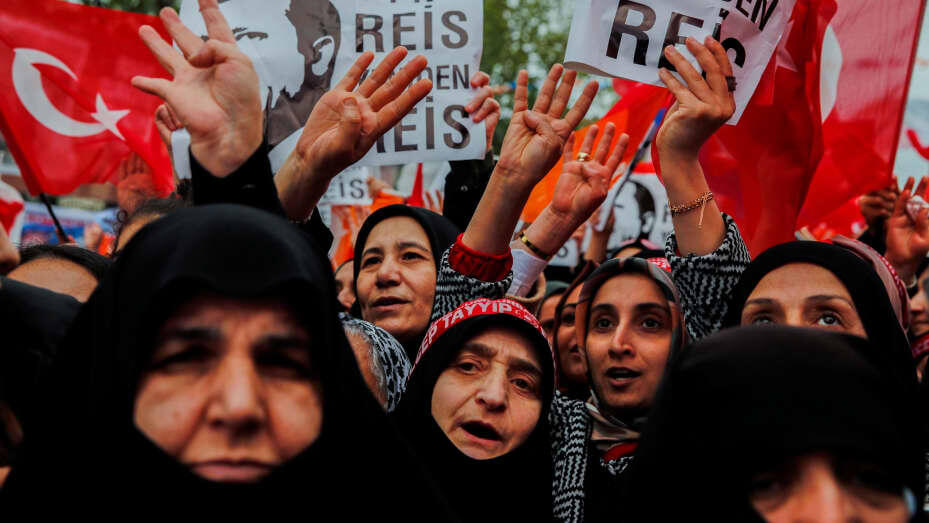In Turkey’s presidential election, neither candidate obtained 50% of the vote, prompting a runoff on 28 May between incumbent President Recep Tayyip Erdoğan and his rival, Kemal Kılıçdaroğlu. It seems improbable that either candidate will modify their stance in the next two weeks.
The outcome of Turkey’s high-stakes election will impact the future of a vital NATO ally and regional power broker at a time when Russia’s invasion of Ukraine has left much of the world in uncertainty.
Overview
The state-run Anadolu news agency reported that after 97.95 percent of votes were counted, Erdoğan had 49.34 percent of the vote, while his main opponent, Kılıçdaroğlu, had 44.99%. This meant that neither candidate could claim an outright victory.
The third contender, Sinan Ogan, garnered 5.28% of the vote, increasing the likelihood that he might play a decisive role in a runoff. A second round of voting is “quite possible,” Ogan said on Twitter, and “Turkish nationalists and Ataturkists are in a key position for this election.”
Kılıçdaroğlu, who expected victory in the runoff, requested his supporters to be patient and accused Erdoğan’s party of meddling with the counting and reporting results.
Meanwhile, Erdoğan has outperformed pre-election surveys, and looked to be in an optimistic and combative mood as he addressed his supporters. “We are already ahead of our closest rival by 2.6 million votes. We expect this figure to increase with official results,” he remarked.
There will be a second round in the presidential elections in Turkey
— Spriter (@Spriter99880) May 14, 2023
After counting 89.24% of the urns:
Erdogan - 49.94%
Kılıçdaroglu - 44.3%
The second round will be held in 2 weeks - May 28, 2023. pic.twitter.com/Oc3wmLt5nG
Yalcin Yildrim, a 39-year-old textile factory owner, stated, “We know it is not exactly a celebration yet, but we hope we will soon celebrate his victory. Erdoğan is the best leader we had for this country and we love him.”
In addition to determining who leads Turkey, the election for president will also determine whether or not the country follows a more secular and democratic path, how it will deal with its severe cost of living crisis, and key relations with Russia, the Middle East, and the West.
Both Rivals Confident in Runoff Outcome
Erdoğan assured supporters in Ankara that he could win; however, he would accept the country’s choice if the race proceeded to a runoff vote in two weeks. Early on Monday, he stated, “We don’t yet know if the elections ended in the first round. ... If our nation has chosen for a second round, that is also welcome.” In 2018, he garnered 60% of the vote from Turkish residents living abroad.
Kılıçdaroğlu stated he would accept and win a runoff, adding that “Despite all of his lies and attacks, Erdoğan did not receive the desired outcome. No one should be enthusiastic about this being a done deal. The election is not won on the balcony,” he remarked, referring to Erdoğan’s speech venue.
“If our nation says second round, we gladly accept it. We will absolutely win this election in the second round. Everyone will see that,” Kılıçdaroğlu declared.
Erdogan
— The Spectator Index (@spectatorindex) May 14, 2023
Mayor of Istanbul: 1994-1998
Prime Minister of Turkey: 2003-2014
President of Turkey: 2014-current
Electoral history: Has won 10 elections in a row pic.twitter.com/PsdgQTKPgE
Consequential Elections in Turkish History
Erdoğan has been in power for over two decades, and is now facing his most difficult battle. Under Erdoğan, Turkey has grown increasingly authoritarian, and the opposition is working to reverse the current pattern.
Six opposition parties had joined forces for the presidential and parliamentary elections on 14 May, with opposition leader Kemal Kılıçdaroğlu chosen as their unity candidate.
Kılıçdaroğlu also has the explicit support of Turkey’s second-largest opposition party, the pro-Kurdish People’s Democratic Party (HDP), whose co-leader has termed the elections as “the most crucial in Turkey’s history.” Kılıçdaroğlu’s selection was not unanimously welcomed, since the mayors of Istanbul and Ankara were potentially stronger choices.
Four contenders were in the presidential race; however, three days before the election, a former Kılıçdaroğlu centre-left party colleague dropped out, blaming deep fake videos attacking him on social media.
Amid various other issues, Turkey is currently dealing with surging inflation and the repercussions of twin earthquakes that killed more than 50,000 people.
Erdoğan: 20 Years Rule
Erdoğan has controlled Turkey since 2003, and his AK Party has been in power since November 2002. A new generation of over 5 million first-time voters has never known another president. He started as PM before becoming president in 2014, after which he drastically expanded his powers in response to an attempted coup in 2016.
In the 2000s and early 2010s, he handled Turkey’s economic and institutional shift. Such policies have earned Erdoğan much respect from his supporters, who claim their lives have improved. He is additionally regarded as enhancing Turkey’s international standing and expanding the country’s influence.
Nonetheless, Erdoğan’s unconventional reluctance to raise interest rates has led many Turks to blame him for the country’s skyrocketing inflation. Academics claim that although the official inflation rate is just over 50%, in reality, it is more than 100%.
Following Turkey’s devastating twin earthquakes on 6 February, Erdoğan and his ruling party have been strongly criticised for mishandling search and rescue efforts and neglecting to modify construction practices in previous years.

